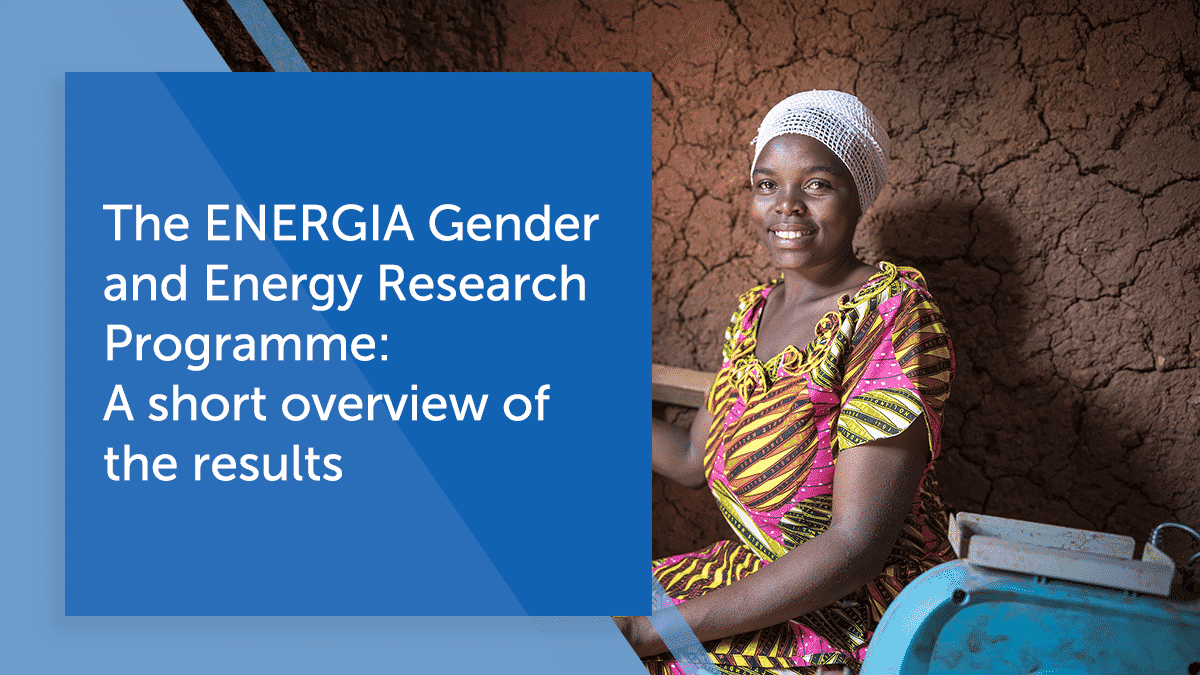ENERGIA is delighted to launch the new issue of ENERGIA News, focused on the Gender and Energy Research Programme (2014 – 2020). The Programme aimed at generating and analysing empirical evidence of the links between gender, energy and poverty, and to translate this evidence into recommendations for energy policy and practice. It shows that it will not be possible to meet targets for affordable, reliable, sustainable, and modern energy access for all by 2030 unless women become part of the equation and their energy needs are met.
With almost a decade left to 2030, energy remains one of the most important drivers to achieve the objectives set by the world’s leaders in September 2015 as part of the 2030 Agenda. Access to affordable, reliable, sustainable and modern energy for all (Sustainable Development Goal 7) is crucial for sustainable development, and has the potential to spur progress across other Sustainable Development Goals (SDGs) including poverty reduction, food security, health, education, gender equality, clean water and sanitation, jobs, innovation, reduced inequality, climate change mitigation and adaptation. However, 840 million people still lack access to electricity and around 3 billion people rely on dirty biomass fuels such as charcoal, coal and animal waste for cooking. To close the energy gap without leaving no one behind, more efforts are required and women need to be included in the transition process. Indeed, our Research Programme shows that it will not be possible to meet targets for affordable, reliable, sustainable, and modern energy access for all by 2030 unless the energy needs of both men and women are met.
In the new issue of ENERGIA News, we have compiled in one document the evidence from our research on the linkages between gender, energy and poverty across 12 countries in collaboration with nine research teams from 29 universities and research institutions. By exploring six thematic areas, the research teams have presented key messages and associated policy implications to advance energy access for all, highlighting where more action is needed to meet this target.
Indeed, one of the major challenges to the achievement of these targets is the lack of a complete understanding and evidence on gender-energy linkages related to SDG 7 on energy and SDG 5 on gender equality that goes beyond case studies. For the past 23 years, ENERGIA has worked at the nexus of energy and gender. Our vision, which is aligned with SDG7 on energy access and SDG5 on gender, aims at increasing women and men’s equal and equitable access to and control over sustainable energy services as an essential right to development. With our five-year research programme on gender and energy (2014-2020), supported by the UK’s Department for International Development (DFID) as part of its Sustainable Energy, Access and Gender (SEAG) programme, we went a step further. The programme aimed at reducing the knowledge gap, offer a valuable source for governments to incorporate gender in policies, programmes and projects, and provide effective evidence to step up actions and enable equitable energy access for both women and men.
The new issue of ENERGIA News includes evidence and highlights from the Gender and Energy Research programme and an article on our synthesis report, which pulls out key implications for energy policy and practice. [This is a link to an explicative video]. It also contains a number of interviews with researchers and policy makers. UN DESA Team Leader Sustainable Energy, Minoru Takada elaborates on the importance of evidence based research for reaching the SDGs. Senior Research Fellow at IDS, Ana Pueyo narrates about the contribution of the research programme to the implementation of the ECOWAS Policy on Gender Mainstreaming on Energy Access, while Associate and Energy Specialist at IISD’s Energy programme Shruti Sharma shares her experience with cross research team collaboration. Sheila Oparaocha, ENERGIA’s International Coordinator and Programme Manager, highlights the added value of implementing a research programme. Lastly, case studies illustrating some of the evidence findings can be found.
In line with our commitment to reduce our impact on the planet and maximise resources, we have shifted from printed to digital dissemination of our publications. As this edition of ENERGIA News, all our publications are now equipped with a QR-code to facilitate easy download, disseminated through our online channels and available online on our website. The downloadable version of this issue of ENERGIA News is available on our website at www.energia.org/energianews2020. Please subscribe to our Newsletter to continue receiving ENERGIA News in the future: www.energia.org/subscribe. Do not forget to follow ENERGIA through our website and social media accounts: @energia_org (Twitter) and energia-gender-energy-network (Linkedin).











Follow us on: